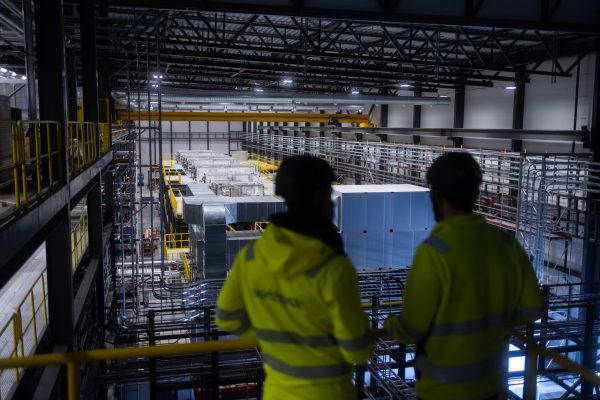Swedish battery startup Northvolt secured a $5 billion debt deal earlier this week, paving the way for the expansion of its first gigafactory as Europe seeks to solidify its home-grown battery manufacturing base.
Northvolt is hoping to become a rare success story in the industry: a battery manufacturing startup that survives. If the company manages to deliver on its plans, it’ll catapult itself and the continent into the top ranks of battery producers.
It’s not an easy path. Outside of China, none of the major battery producers are startups; they’re either spinoffs or subsidiaries of existing industrial juggernauts. Even China’s leading battery companies, CATL and BYD, are related to existing manufacturers, and all of them have benefited from generous state subsidies and industrial policies.
Northvolt’s $5 billion loan won’t be enough to guarantee success, but it should be enough to help ramp up its production to a targeted 60 gigawatt hours, enough for over 1 million Volkswagen ID.3s, Europe’s best-selling, non-Tesla EV. The company said it has offtake contracts totaling over $55 billion with automakers, including BMW, Volkswagen, Volvo and Scania.
The new loan includes the refinancing of an existing $1.6 billion debt facility from 2020. Northvolt said the debt package was provided by the European Investment Bank and the Nordic Investment Bank. JPMorgan Chase, Citigroup, and BNP Paribas also provided a portion of the financing, the Wall Street Journal reported.
Northvolt is also building factories in Germany and Montreal, the latter of which is meant to attract production tax credits in the U.S., offered by the Inflation Reduction Act (IRA).
The U.S. battery industry has surged in the wake of the IRA, and a new “battery belt” has sprung up, stretching from Michigan to Georgia, drawing nearly $100 billion in investments from automakers and battery manufacturers. But despite the wave of investment, the U.S. lacks a homegrown battery manufacturer like Europe has in Northvolt.
That might turn out to be no problem at all given the U.S.’s strong relations with Japan, home to Panasonic, and South Korea, home to LG Energy Solution, SK On and Samsung SDI. Still, the States’ lack of a domestic anchor is notable.
There are likely a few reasons why there is no equivalent of Northvolt in the U.S. For one, when the electric vehicle sector was emerging, the U.S. was under the Trump administration, which was too busy trying to get out of the non-binding Paris Agreement to recognize the tectonic shift that was occurring. The Trump administration talked a lot about bringing steel and coal back, but it didn’t have many conversations about sectors with growth potential. Semiconductor manufacturing is a notable exception, though most of the Trump administration’s policy revolved around blocking Chinese access to leading edge technology rather than boosting domestic capacity.
Another reason might be the long hangover resulting from the bankruptcy and eventual sale of one-time battery pioneer, A123 Systems, to China.
A123 was a darling of the clean tech era. Founded in 2001, the company was built on a new battery technology known as lithium-iron-phosphate, or LFP. Cells made with LFP were heavier, but could also store more power, and were safer than existing lithium-cobalt-oxide cells. Even today, LFP is safer and cheaper than the leading chemistries, nickel-manganese-cobalt and nickel-cobalt-manganese-aluminum.
The startup labored for years, building a customer base and partnering with manufacturers to get its cells to market. Then, in August 2009, on the back of a deal with GM to supply batteries for the forthcoming Volt plug-in hybrid, A123 received a $249 million grant from the federal government and $125 million from Michigan to build a plant near Detroit.
The money was transformative and gave the company a chance to compete with Korean manufacturers, which were already dominant in the industry. A123 raced to develop a supply chain while building a factory to make batteries on a scale never before attempted in the U.S.
The company got close, but stumbled. A series of mishaps, headlined by a Fisker Karma that lost power while Consumer Reports was testing it, set the startup on the path toward bankruptcy. Johnson Controls tried to buy the company out of receivership in 2012 but lost the bid by $5 million to Wanxiang, a Chinese auto parts giant.
Since then, battery startups founded in the U.S. have focused on pieces of the supply chain, mostly by developing innovative anode, cathode and electrolyte materials. Given the supply chain and scaling woes that A123 encountered, it has been a sensible approach.
But from an industrial policy perspective, it makes sense for the U.S. to champion a domestic company that produces entire cells and packs, similar to the approach Europe has taken with Northvolt. Japanese and Korean companies have been stable and committed partners that have pledged tens of billions of dollars in investment in U.S. manufacturing. But they’re also subject to the priorities of their home countries. Both Japan and Korea have been hedging their battery bets by promoting hydrogen in an attempt to break free from Chinese supply chain dominance.
The U.S. is already building the foundations of a stable battery supply chain supported by domestic or free trade-accessible partners, and it has a wealth of innovative and scalable battery materials companies. It’s just missing one piece of the puzzle: final manufacturing, a piece that’s all the more obvious in the wake of Northvolt’s most recent deal.
